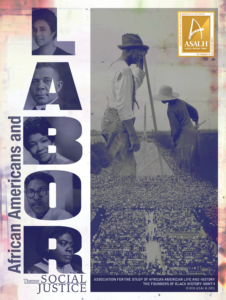Black History Themes
When Carter G. Woodson established Negro History Week in 1926, he realized the importance of providing a theme to focus the attention of the public. The intention has never been to dictate or limit the exploration of the Black experience but to bring to the public’s attention important developments that merit emphasis.
For those interested in the study of identity and ideology, an exploration of ASALH’s Black History themes is itself instructive. Over the years, the themes reflect changes in how people of African descent in the United States have viewed themselves, the influence of social movements on racial ideologies, and the aspirations of the black community.
The changes notwithstanding, the list reveals an overarching continuity in ASALH–our dedication to exploring historical issues of importance to people of African descent and race relations in America.
USE OF THE THEME
The public is encouraged to use the theme, and permission to use the Executive Summaries is extended to all. The only requirement is to cite asalh.org.
2025 Black History Theme
African Americans and Labor
2025 – African Americans and Labor

The 2025 Black History Month theme, African Americans and Labor, focuses on the various and profound ways that work and working of all kinds – free and unfree, skilled, and unskilled, vocational and voluntary – intersect with the collective experiences of Black people. Indeed, work is at the very center of much of Black history and culture. Be it the traditional agricultural labor of enslaved Africans that fed Low Country colonies, debates among Black educators on the importance of vocational training, self-help strategies and entrepreneurship in Black communities, or organized labor’s role in fighting both economic and social injustice, Black people’s work has been transformational throughout the U.S., Africa, and the Diaspora. The 2025 Black History Month theme, “African Americans and Labor,” sets out to highlight and celebrate the potent impact of this work.
Considering Black people’s work through the widest perspectives provides versatile and insightful platforms for examining Black life and culture through time and space. In this instance, the notion of work constitutes compensated labor in factories, the military, government agencies, office buildings, public service, and private homes. But it also includes the community building of social justice activists, voluntary workers serving others, and institution building in churches, community groups, and social clubs and organizations. In each of these instances, the work Black people do and have done have been instrumental in shaping the lives, cultures, and histories of Black people and the societies in which they live. Understanding Black labor and its impact in all these multivariate settings is integral to understanding Black people and their histories, lives, and cultures.
Africans were brought to the Americas to be enslaved for their knowledge and serve as a workforce, which was superexploited by several European countries and then by the United States government. During enslavement, Black people labored for others, although some Black people were quasi-free and labored for themselves, but operated within a country that did not value Black life. After fighting for their freedom in the Civil War and in the country’s transition from an agricultural based economy to an industrial one, African Americans became sharecroppers, farm laborers, landowners, and then wage earners. Additionally, African Americans’ contributions to the built landscape can be found in every part of the nation as they constructed and designed some of the most iconic examples of architectural heritage in the country, specifically in the South.
Over the years to combat the superexploitation of Black labor, wage discrepancies, and employment discrimination based on race, sex, and gender, Black professionals (teachers, nurses, musicians, and lawyers, etc.) occupations (steel workers, washerwomen, dock workers, sex workers, sports, arts and sciences, etc.) organized for better working conditions and compensation. Black women such as Addie Wyatt also joined ranks of union work and leadership to advocate for job security, reproductive rights, and wage increases.
2025 marks the 100-year anniversary of the creation of Brotherhood of Sleeping Car Porters and Maids by labor organizer and civil rights activist A. Philip Randolph, which was the first Black union to receive a charter in the American Federation of Labor. Martin Luther King, Jr incorporated issues outlined by Randolph’s March on Washington Movement such as economic justice into the Poor People’s Campaign, which he established in 1967. For King, it was a priority for Black people to be considered full citizens.
The theme, “African Americans and Labor,” intends to encourage broad reflections on intersections between Black people’s work and their workplaces in all their iterations and key moments, themes, and events in Black history and culture across time and space and throughout the U.S., Africa, and the Diaspora. Like religion, social justice movements, and education, studying African Americans’ labor and labor struggles are important organizing foci for newinterpretations and reinterpretations of the Black past, present, and future. Such new considerations and reconsiderations are even more significant as the historical forces of racial oppression gather new and renewed strength in the 21st century.

 Donate to Black History Month
Donate to Black History Month